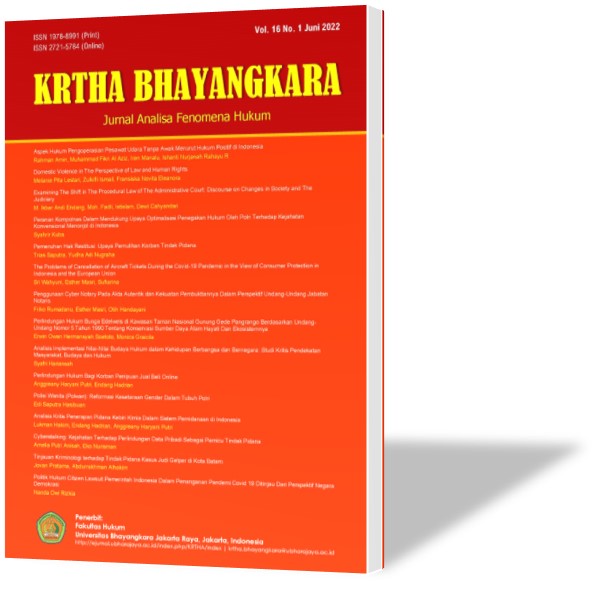Understanding The Danger of Bullying: A Phenomenological Study on Female College Students As Victims of Cyberbullying
DOI:
https://doi.org/10.31599/krtha.v18i1.2921Keywords:
Bullying, Cyberbullying, phenomenologyAbstract
Cyberbullying in social media until now is a problem that has not been appropriately resolved. The presence of social media certainly has consequences in human life, including shaping cyberbullying behaviour itself. Cyberbullying is an aggressive behaviour that is carried out deliberately and repeatedly by individuals and groups using telecommunication media to harm others emotionally and psychologically so that it has an impact on the lives of individuals as victims of cyberbullying. Therefore, this study seeks to explore how to describe the dangers of bullying for students who become victims of cyberbullying. This research uses a qualitative phenomenological approach. The subjects of this study are three students who are active on social media networks and have been victims of cyberbullying. Purposive sampling techniques are used to find research subjects. Data results are analyzed using phenomenological analysis. Research shows that three of the victims have been victims of cyberbullying. Besides that, sequentially, the psychological dynamics of the third subject start with the Subject's family state, the Subject, the personality of the Subject, the Subject's daily activities, cyberbullying, the dangers of cyberbullying, and the preventive efforts of cyberbullying.
References
Abaido, G. M. (2020). Cyberbullying on social media platforms among university students in the United Arab Emirates. International Journal of Adolescence and Youth, 25(1), 407–420. https://doi.org/10.1080/02673843.2019.1669059
Abdillah, R., Aulia Ibrahim, A., Odelia Emmanuelha Sirait, N., Krissan Oktavia, N., Widyadari, R., Febriyanti Amanda, S., & Nabila Jansa, S. (2023). Studi Psikologi Siber Tentang Dampak Hate Speech Bagi Pengguna Media Sosial Cyber Psychology Study on the Impact of Hate Speech for Social Media Users. Sibatik Journal | Volume, 2(11), 3459–3472. https://publish.ojs-indonesia.com/index.php/
Adawiyah, S. R. (2019). Faktor-Faktor yang Mempengaruhi Cyberbullying pada Remaja. Prosiding Seminar Nasional Magister Psikologi Universitas Ahmad Dahlan, 398–403.
Ali, W. N. A. W., Ni, T. Q., & Idrus, S. Z. S. (2020). Social Media Cyberbullying: Awareness and Prevention through Anti Cyberbully Interactive Video (ACIV). Journal of Physics: Conference Series, 1529(3). https://doi.org/10.1088/1742-6596/1529/3/032071
Alzaqebah, M., Jaradat, G. M., Nassan, D., Alnasser, R., Alsmadi, M. K., Almarashdeh, I., Jawarneh, S., Alwohaibi, M., Al-Mulla, N. A., Alshehab, N., & Alkhushayni, S. (2023). Cyberbullying detection framework for short and imbalanced Arabic datasets. Journal of King Saud University - Computer and Information Sciences, 35(8), 101652. https://doi.org/10.1016/j.jksuci.2023.101652
Balamurugan, G., & Jayabharathy, J. (2022). Cyberbully Classification Based on Tweet Texts for Detection of Phishing Links BT - Smart Data Intelligence (R. Asokan, D. P. Ruiz, Z. A. Baig, & S. Piramuthu (eds.); pp. 367–374). Springer Nature Singapore.
Bayraktar, F., Machackova, H., Dedkova, L., Cerna, A., & Ševčíková, A. (2015). Cyberbullying: The Discriminant Factors Among Cyberbullies, Cybervictims, and Cyberbully-Victims in a Czech Adolescent Sample. Journal of Interpersonal Violence, 30(18), 3192–3216. https://doi.org/10.1177/0886260514555006
Bulan, M. A. I. C., & Wulandari, P. Y. (2021). Pengaruh Kontrol Diri Terhadap Kecenderungan Perilaku Cyberbullying Pada Remaja Pengguna Media Sosial Anonim. Buletin Riset Psikologi Dan Kesehatan Mental (BRPKM), 1(1), 497–507.
Carvalho, M., Branquinho, C., & de Matos, M. G. (2021). Cyberbullying and Bullying: Impact on Psychological Symptoms and Well-Being. Child Indicators Research, 14(1), 435–452. https://doi.org/10.1007/s12187-020-09756-2
Creswell, J. W. (2009). RESEARCH DESIGN Qualitative, Quantitative, and Mixed Methods Approaches. In SAGE Publications. https://doi.org/10.2307/1523157
Extremera, N., Quintana-Orts, C., Mérida-López, S., & Rey, L. (2018). Cyberbullying victimization, self-esteem and suicidal ideation in adolescence: Does emotional intelligence play a buffering role? Frontiers in Psychology, 9(MAR), 1–9. https://doi.org/10.3389/fpsyg.2018.00367
Fazry, L., & Apsari, N. C. (2021). Pengaruh Media Sosial Terhadap Perilaku Cyberbullying Di Kalangan Remaja. Jurnal Pengabdian Dan Penelitian Kepada Masyarakat (JPPM), 2(1), 28–36.
Ferreira, P. da C., Barros, A., Pereira, N., Marques Pinto, A., & Veiga Simão, A. M. (2021). How Presenteeism Shaped Teacher Burnout in Cyberbullying Among Students
KRTHA BHAYANGKARA | Volume 18 Number 1, April 2024
Kus Hanna Rahmi, Rijal Abdillah, Andreas Corsini Widya Nugraha 83
During the COVID-19 Pandemic. Frontiers in Psychology, 12(October). https://doi.org/10.3389/fpsyg.2021.745252
Fitransyah, R. Ri., & Waliyanti, E. (2018). Perilaku Cyberbullying dengan Media Instagram Pada Remaja di Yogyakarta. Indonesian Journal of Nursing Practices, 2(1), 36–48. https://doi.org/10.7748/ns.6.4.52.s68
Gan, X., Qin, K. N., Xiang, G. X., & Jin, X. (2023). The relationship between parental neglect and cyberbullying perpetration among Chinese adolescent: The sequential role of cyberbullying victimization and internet gaming disorder. Frontiers in Public Health, 11(1). https://doi.org/10.3389/fpubh.2023.1128123
Hana, D. R., & Suwarti, S. (2020). Dampak Psikologis Peserta Didik yang Menjadi Korban Cyber Bullying. Psisula: Prosiding Berkala Psikologi, 1(11), 20–28. https://doi.org/10.30659/psisula.v1i0.7685
Haris, H. (2010). Metodologi penelitian kualitatif untuk ilmu-ilmu sosial. Salemba Humanika.
Haris, H. (2013). Wawancara, Observasi & Focus Groups sebagai instrumen penggalian data kualitatif. Rajawali Pers. https://isbn.perpusnas.go.id/Account/SearchBuku?searchTxt=978-979-769-611-5&searchCat=ISBN
Kurnia Pratiwi, S. K. P., & Kusuma, R. S. (2019). Perilaku Cyberbullying Mahasiswa Dengan Teman Sebaya. Mediator: Jurnal Komunikasi, 12(2), 165–177. https://doi.org/10.29313/mediator.v12i2.4793
Manzilati, A., Aulia, D., Mayangsari, I. D., Nurudin, M., Morissan, Creswell, J. W., Wiryanto, Hassan, M. S., Shaffril, H. A. M., Samah, B. A., Ali, M. S. S., Ramli, N. S., Maulana, K. A. F., Sugiyono, Sahimi, N. N., Wibowo, F., Nisa, K., Naratama, Nuansa, N. B., … Ibrahim. (2014). Metodologi Penelitian Kualitatif: Paradigma, Metode, dan Aplikasi. Jurnal Visi Komunikasi.
Markogiannaki, M., Biniari, L., Panagouli, E., Thomaidis, L., Sergentanis, T. N., Bacopoulou, F., Babalis, T., Psaltopoulou, T., Tsolia, M., Martens, H., & Tsitsika, A. (2021). Adolescent Perspectives About Online Hate Speech: Qualitative Analysis in the SELMA Project. Acta Medica Academica, 50(2), 264–276. https://doi.org/10.5644/ama2006-124.342
Mawardah, M., & Adiyanti, M. (2014). Regulasi Emosi dan Kelompok Teman Sebaya Pelaku Cyberbullying. Jurnal Psikologi, 41(1), 60. https://doi.org/10.22146/jpsi.6958
Mutma, F. S. (2020). Deskripsi Pemahaman Cyberbullying di Media Sosial pada Mahasiswa. Jurnal Common, 4(1), 32–55. https://doi.org/10.34010/common.v4i1.2170
Ningrum, A. I. (2018). Bullying dan Kekerasan ( Studi Kualitatif Ospek Fakultas di Universitas Airlangga ). Jurnal Sosiologi Universitas Airlangga, 37.
Priscilla, M., & Widjaja, Y. (2020). Gambaran pemilihan strategi coping terhadap stres pada mahasiswa Fakultas Kedokteran Universitas Tarumanagara. Tarumanegara Medical Journal, 2(1), 121–131.
Ragasukmasuci, L. B., & Adiyanti, M. G. (2019). Kecenderungan Remaja menjadi Pelaku Perundungan-Siber: Kontribusi Harga Diri dan Kesepian. Gadjah Mada Journal of Psychology (GamaJoP), 5(2), 187. https://doi.org/10.22146/gamajop.48450
Reason, L., & Boyd, M. (2016). Cyberbullying in Rural Communities: Origin and Processing through the Lens of Older Adolescents (pp. 2331–2348). The Qualitative Report.
Riswanto, D., & Marsinun, R. (2020). Perilaku Cyberbullying Remaja di Media Sosial. Analitika, 12(2), 98–111. https://doi.org/10.31289/analitika.v12i2.3704
Sari, D. P. C. (2017). Keterbukaan Diri Pada Remaja Korban Cyberbullying. Psikoborneo: Jurnal Ilmiah Psikologi, 5(1), 69–73. https://doi.org/10.30872/psikoborneo.v5i1.4332
Schneider, S. K., O’donnell, L., Stueve, A., & Coulter, R. W. S. (2012). Cyberbullying, school bullying, and psychological distress: A regional census of high school students. American Journal of Public Health, 102(1), 171–177. https://doi.org/10.2105/AJPH.2011.300308
Sittichai, R., & Smith, P. K. (2018). Bullying and cyberbullying in Thailand: Coping strategies and relation to age, gender, religion and victim status. Journal of New Approaches in Educational Research, 7(1), 24–30. https://doi.org/10.7821/naer.2018.1.254
Smith, P. K., Mahdavi, J., Carvalho, M., Fisher, S., Russell, S., & Tippett, N. (2008). Cyberbullying: Its nature and impact in secondary school pupils. Journal of Child Psychology and Psychiatry and Allied Disciplines, 49(4), 376–385. https://doi.org/10.1111/j.1469-7610.2007.01846.x
Spears, B. A., Taddeo, C. M., Daly, A. L., Stretton, A., & Karklins, L. T. (2015). Cyberbullying, help-seeking and mental health in young Australians: implications for public health. International Journal of Public Health, 60(2), 219–226. https://doi.org/10.1007/s00038-014-0642-y
Sudarman. (2014). Fenomenologi Husserl Sebagai Metode Filsafat Eksistensial. Jurnal Lintas Agama, 9(2), 103–113.
Tomé-Fernández, M., Ortiz-Marcos, J. M., & Fernández-Leyva, C. (2022). Correlational study on cyberbullying and social abilities in intercultural teenagers. Frontiers in Psychology, 13(July), 1–14. https://doi.org/10.3389/fpsyg.2022.848678
Wang, C. W., Musumari, P. M., Techasrivichien, T., Suguimoto, S. P., Chan, C. C., Ono-Kihara, M., Kihara, M., & Nakayama, T. (2019). “i felt angry, but i couldn’t do anything about it”: A qualitative study of cyberbullying among Taiwanese high school students. BMC Public Health, 19(1), 1–12. https://doi.org/10.1186/s12889-019-7005-9
Wu, W., Chen, Y., Shi, X., Lv, H., Bai, R., Guo, Z., Yu, L., Liu, Y., Liu, J., Chen, Y., & Zeng, Y. (2022). The Mobile Phone Addiction and Depression Among High School Students: The Roles of Cyberbullying Victimization, Perpetration, and Gender. Frontiers in Psychology, 13(April), 1–12. https://doi.org/10.3389/fpsyg.2022.845355
Xiang, G. X., Zhang, Y. H., Gan, X., Qin, K. N., Zhou, Y. N., Li, M., & Jin, X. (2022). Cyberbullying and internet gaming disorder in Chinese youth: The role of positive youth development attributes. Frontiers in Public Health, 10. https://doi.org/10.3389/fpubh.2022.1017123




































